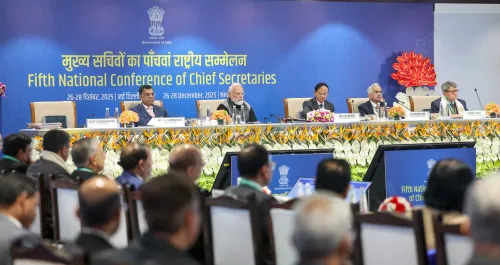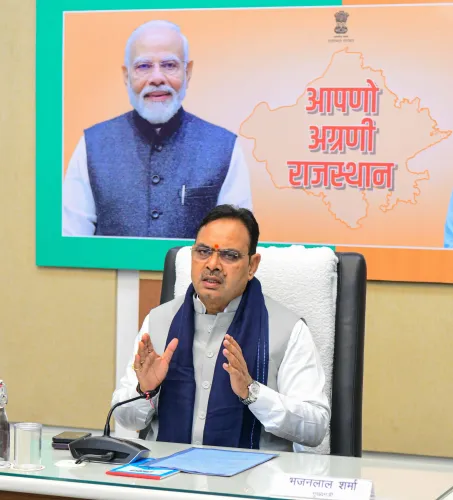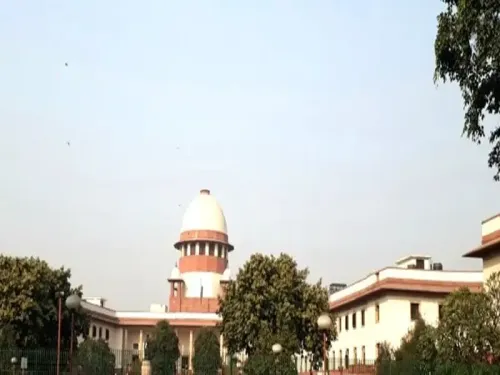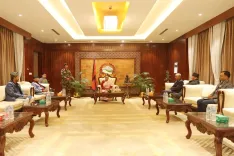Is India's Diplomacy Winning? BRICS Condemns Pahalgam Attack, Says Tuhin Sinha
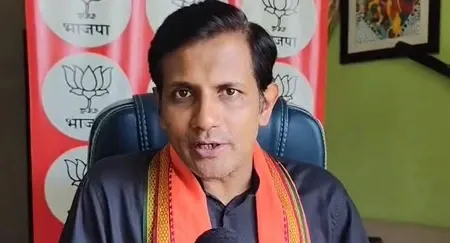
Synopsis
Key Takeaways
- BRICS' condemnation of the Pahalgam attack highlights international support for India's fight against terrorism.
- India's growing diplomatic influence is evident through its mention in the Rio Declaration.
- The Gini Index demonstrates improved income equality in India.
- Direct Benefit Transfer has played a crucial role in reducing poverty.
- Political narratives must align with factual data for meaningful discourse.
New Delhi, July 7 (NationPress) BJP National Spokesperson Tuhin Sinha expressed his approval of the BRICS nations' robust condemnation of the Pahalgam terror attack, which resulted in the deaths of 26 individuals, labeling it a “significant diplomatic triumph” for India.
His comments came after the endorsement of the ‘Rio de Janeiro Declaration’ at the 17th BRICS Summit, where member nations collectively condemned the April 22 terror attack and reaffirmed their dedication to fighting terrorism in every form.
In an interview with IANS, Tuhin Sinha remarked, “This is a notable diplomatic success. The BRICS statement comprises 31 pages with 126 paragraphs, and India is referenced 10 times. The Pahalgam attack is condemned in clear, unequivocal terms. It illustrates India’s growing influence and the credibility of our stance on terrorism on a global scale.”
The declaration, adopted in Brazil’s Rio de Janeiro on the summit's first day, strongly denounced all forms of terrorism as “criminal and unjustifiable”, irrespective of motivation, time, place, or perpetrators.
“We condemn in the strongest terms the terrorist attack in Jammu and Kashmir on April 22, 2025, which led to at least 26 fatalities and numerous injuries. We reaffirm our commitment to combating terrorism in all its forms and manifestations, including cross-border terrorist movements, terrorism financing, and safe havens,” states Paragraph 34 of the declaration.
Sinha pointed out that the unified position of BRICS, following a similar affirmation from the QUAD, indicates an increasing international alignment with India’s counter-terrorism stance.
“This demonstrates that under Prime Minister Narendra Modi’s leadership, India’s voice is being acknowledged and respected worldwide,” he added.
He also criticized the Congress party for questioning the effectiveness of India’s foreign policy after 'Operation Sindoor', stating, “Those who alleged that India’s diplomacy was failing should now reflect on this. This global consensus on the Pahalgam issue is a result of strategic diplomacy and ongoing global engagement.”
Tuhin Sinha referenced a World Bank report that ranked India as the fourth most equitable nation concerning income distribution.
The report attributes a significant decline in extreme poverty and income inequality from 2011-12 to 2022-23, with over 171 million individuals lifted out of extreme poverty during that period.
Sinha highlighted the significance of the Gini Index, an essential economic indicator of income inequality.
“India’s Gini index is now lower than that of China, indicating that India has achieved better income equality than both the United States and China — a remarkable accomplishment for a nation of our size,” he stated.
“Poverty in India has now decreased to roughly four percent,” he added.
“This is not merely a statistical success but a result of persistent policy efforts. PM Modi’s government has prioritized inclusive development, with initiatives like Direct Benefit Transfer (DBT) playing a crucial role.”
According to Sinha, Rs 40 lakh crore has been directly transferred to the poor over the last decade through DBT.
“These transfers have ensured that government benefits reach the intended beneficiaries without leakages — a significant reform in public welfare delivery.”
Sinha further criticized the Congress party, particularly senior leader Jairam Ramesh, for what he termed as “propaganda” regarding poverty and inequality.
“Despite the data, if Congress continues to assert that only two businessmen control the country’s wealth while poverty is escalating, it is nothing but political maneuvering. Jairam Ramesh and his party are denying facts and economic principles merely to maintain relevance,” he remarked.
He concluded that such narratives are misleading and diminish the achievements India has made.
“Instead of perpetuating propaganda daily, the Congress should recognize facts, reflect on the data, and appreciate the economic transformation occurring,” he stated.



